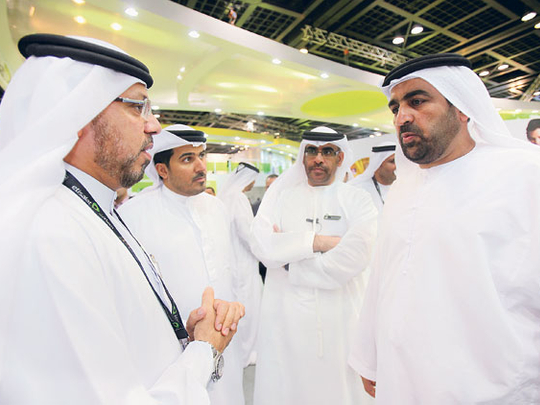
Dubai: A new high-tech plan rolled out yesterday could slash the UAE's daily electric power consumption by 30 per cent, say government and business leaders.
Seventy per cent of an estimated 56.6 terrawatts of power consumed by the UAE is used to cool and light buildings, electricity consumption that when combined with water usage and discarded waste gives the UAE one of the highest carbon footprints in the world.
Minister of Environment and Water Rashid Ahmad Bin Fahd joined with etisalat and Pacific Control Systems at Dubai's annual Gitex Technology Week to unveil Emirates Energy Star, a programme that monitors energy use in buildings in real-time via telecom infrastructure from a command centre in Dubai.
Bin Fahd said the launch of the programme was a big step toward a greener tomorrow for the UAE.
Big tool
"This is a big advancement and will help reduce our carbon footprint," Bin Fahd told Gulf News in an exclusive interview.
"Technology is a very big tool to make this project work. It's another big day, a good day for the environment in the UAE."
Bin Fahd lauded etisalat and Pacific Control Systems for launching a machine-to-machine technological project, the first of its kind in the Middle East, that electronically monitors buildings, assesses energy usage and then adjusts devices in the building to stem wastage of electricity.
He said both companies have the full support of the Environment Ministry to help slash energy consumption as a means of finding more capacity amid projections that energy consumption will double by 2020 in a country struggling to keep up with power demands of urbanisation, increasing population and industrialisation.
Etisalat believes the new Emirates Energy Star programme is one of the most important projects that will lead the country into the future, said Abdullah Hashim, etisalat senior vice-president of business solutions.
"What we're doing is essentially making technology protect the environment," Hashim told Gulf News at Gitex. "We can monitor and control energy like never before, it's energy conservation."
Dramatic change
The control centre at Pacific Control Systems' green building in Jebel Ali is capitalising on etisalat's infrastructure and latest technological innovations, said Hashim, to monitor buildings in the UAE — phone lines, high-speed internet connection, wireless systems and machine-to-machine communication have enabled the control room to monitor and adjust energy-using devices.
"This is where etisalat will add value to the project and help with the solution," Hashim said.
Dilip Rahulan, Pacific Controls Chairman and CEO, said the partners have identified 10 corporate clients for significant savings.
Buildings in government, education, transport and financial sectors will be targeted for a "dramatic change" in savings of up to one-third under the five-star level of the Emirates Energy Star programme, said Rahulan.
"Today, we realise that 70 per cent of energy in the UAE goes to buildings," he said. "If within four years we can reduce 20 per cent of that, it will reduce our carbon footprint."
Nigel MacKenzie, Pacific Control's chief technical officer, said air conditioning is usually the biggest electrical draw, but with proper management under the new Emirates Energy Star programme can be brought under control for peace of mind and affordability for building owners.
"Where there is a lot of abuse here is people do leave their air conditioners on for 24 hours a day. If you nip that back eight hours, you can reduce things by 30 per cent," said MacKenzie.
With the latest slab tariff system introduced by the Dubai Electricity and Water Authority and the accompanying higher costs for higher usage, it makes sense for building owners to do what they can to reduce their consumption, he said.
Once industrial commercial sector customer's consumption rises above the 10,000 Kw/h threshold, costs jump by 40 per cent, he said.










